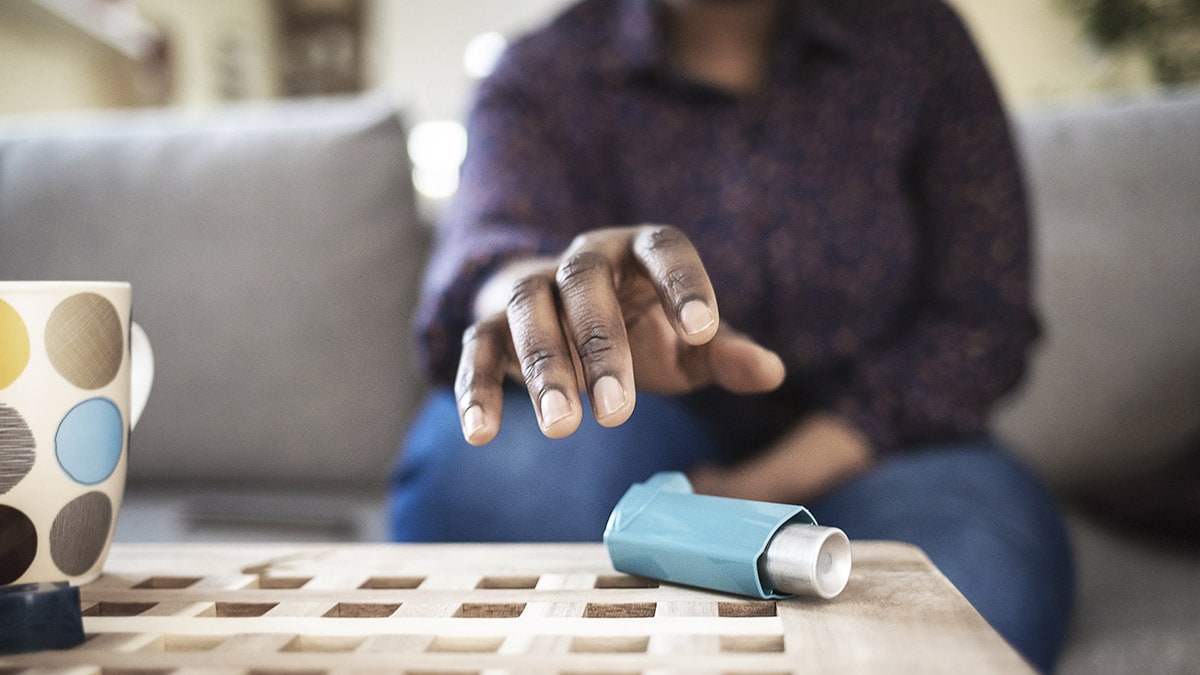Key points
- People with any chronic condition should take the following steps to protect themselves from wildfire smoke.

Prepare for wildfire season
- Talk to your healthcare provider. Plan how you will protect yourself against wildfire smoke.
- Stock up on medicine. Store a 7 to 10-day supply of prescription medicines in a waterproof, childproof container to take with you if you evacuate.
- Buy groceries you won't need to cook. Frying or grilling especially can make indoor air pollution worse.
During a wildfire smoke event
Protect yourself from wildfire smoke
- Pay attention to air quality reports. Follow instructions about exercise and going outside for "sensitive individuals."
- Follow your healthcare provider's advice and your asthma action plan if you have one.
- Think about evacuating if you have trouble breathing or other symptoms that do not get better.
- Stay inside as much as possible. Keep windows and doors closed and turn on an HVAC system with a filter or use a portable air filter if available.
- Check the HeatRisk level. Follow your heat action plan if you have one. Call 2-1-1 or contact your local health department to find the nearest cooling centers in your area.
- If you must go outdoors during a wildfire smoke event, wear a NIOSH Approved N95 respirator.
Can children wear respirators?
Children ages 2 years and older can wear respirators and masks. However, NIOSH Approved respirators do not come in suitable sizes for very young children. Choose a comfortable respirator or mask that your child can wear properly. If a respirator or mask fits poorly or is uncomfortable, a child might take it off or wear it incorrectly (for example, pulling it down from their nose). This reduces the intended benefits.
- Choose a size that fits over the child's nose and under the chin but does not impair vision.
- Follow the user instructions for the respirator or mask. These instructions may show how to make sure it fits properly.
NIOSH Approved respirators and international respirators may be available in smaller sizes that fit children. However, manufacturers typically design them to be used by adults in workplaces. They may not have been tested for broad use in children.
Reminder
Stay safe after a wildfire
- Do not return home until you are told it is safe to do so.
- Look out for any symptoms. Contact your healthcare provider if you have trouble breathing, shortness of breath, cough that won't stop, or other symptoms that do not go away. Call 9-1-1 or go right away to an emergency department for medical emergencies.
- Smoke can stay in the air days after wildfires have ended so continue to check local air quality.
Tips for people with specific chronic conditions
Asthma
If you or your child has asthma, know what to do if there is wildfire smoke outside.
- Follow your healthcare provider's advice and your asthma action plan if you have one.
- If you go to a shelter, make sure officials know that you or your child has asthma.
- Look out for any asthma symptoms.
- Contact your healthcare provider if you have trouble breathing, shortness of breath, cough that won't stop, or other symptoms that do not go away.
- Call 9-1-1 or go right away to an emergency department for medical emergencies.
Chronic Obstructive Pulmonary Disease (COPD)
If you have Chronic Obstructive Pulmonary Disease (COPD), know what to do if there is wildfire smoke outside.
- Talk to your healthcare provider about your COPD.
- Plan how you will protect yourself against wildfire smoke.
- If you go to a shelter, make sure officials know that you have COPD.
Diabetes
If you have diabetes, know what to do during if there is wildfire smoke outside.
- Talk to your healthcare provider about your diabetes.
- Plan how you will protect yourself against wildfire smoke.
- If you go to a shelter, make sure officials know that you have diabetes.
Heart Disease
If you have heart disease, know what to do during if there is wildfire smoke outside.
- Talk to your healthcare provider about your heart disease.
- Plan how you will protect yourself against wildfire smoke.
- Think about evacuating if you have trouble breathing or other symptoms that do not get better. If you have heart palpitations, unusual fatigue, or shortness of breath, or other symptoms of a heart attack, contact your healthcare provider.
- If you go to a shelter, make sure officials know that you have heart disease.
- Look out for any symptoms. Contact your healthcare provider if you have trouble breathing, shortness of breath, cough that won't stop, or other symptoms that do not go away.
- Call 9-1-1 or go right away to an emergency department for medical emergencies like severe trouble breathing, chest pain, or if you think you are having a heart attack or stroke.
